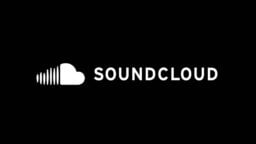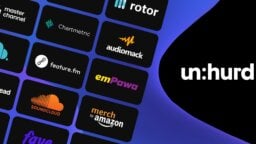When Alexander Ljung tells MBW that SoundCloud boasts a “larger scale than anything else out there”, he’s half right.
The online music platform is used by somewhere close to 200m unique monthly listeners; a giant number that dwarfs even Spotify‘s recent soaring growth.
Apple Music is still a few hours away from arrival, so with a sprinkle of selective context and dash of generosity, Ljung’s claim holds true.
(We’ll take it he means audio-only platforms; YouTube famously entertains a monthly audience in excess of a billion people.)
There’s a key reason why all of these users are playing tracks on SoundCloud, of course: ever since the Berlin-based service launched in 2007, it’s been completely free.
This remains a big bone of contention amongst rights-holders. For eight years, SoundCloud’s gigantic popularity simply hasn’t paid.
But recently, this has begun threatening to change.
First, SoundCloud licensed one of the ‘big three’, Warner Music Group, in late 2014 – on the understanding that a subscription tier of the service would launch this year.
(That tier still hasn’t arrived – although Ljung promises it remains in the works.)
In addition, SoundCloud has launched its On SoundCloud programme, which passes commercial partners like Warner a share of advertising revenue.
On SoundCloud paid out $1m to 100 rights-holders in its first six months.
It’s a far cry from Spotify’s $300m paycheque to rights holders in the first quarter of 2015. But it’s a start.
Perhaps the most intriguing aspect of Warner’s SoundCloud licensing deal was that it negotiated an equity stake thought to be worth around 5% of the business.
It is probable (although not confirmed) that Ljung and fellow co-founder Eric Wahlforss also handed out slivers of their company to music publishers in the US via the NMPA and up to 20,000 independent labels via commercial rep Merlin.
Both parties recently joined Warner in officially licensing SoundCloud, and both have made it very clear they want to see a subscription service sooner rather than later.
That really just leaves Universal and Sony left to license for SoundCloud; a mission that is obviously not proving straightforward.
In May, Sony’s US company began pulling down SoundCloud tracks by artists such as Hozier and Adele.
This didn’t go down well with one of the major’s own stars, SoundCloud fan Madeon, who tweeted that his record company was “holding its own artists hostage”.
In a clear bid to please music rights-holders, SoundCloud this month placed strict play limits on third-party apps – an apparent bid to harm shady ‘ripping’ services which enable users to take tracks offline.
UMG and Sony’s refusal to sign up (so far) isn’t SoundCloud’s biggest headache, either: in FY 2013, it posted a $29m loss on $14m revenues.
Despite this monetary waywardness, Ljung and Wahlforss are impressing the right people: the Financial Times just placed the duo at No.5 in its list of Europe’s top tech entrepreneurs. (Spotify’s Daniel Ek was at No.1).
So can SoundCloud’s recent pivot towards legitimacy attract the major labels – and eventually help it turn a profit?
And what will the arrival of Apple Music (and its SoundCloud-esque Connect channel) mean for the company’s fortunes?
MBW grilled Alexander Ljung to get the inside track on his firm’s recent manouvres.
Warning: we were greeted by ‘no comment’ rather more than we’re accustomed to…
You have now Warner on board as a fully licensed partner. Are you confident of doing a deal with Sony and Universal?
I’m not going to comment about any potential negotiations.
We’ve announced all the partners that are in the programme. And with NMPA and then Merlin [signing deals this year], we’re really happy about how that’s evolving.
“We are talking to other partners, and there will be other announcements.”
There are definitely a lot of other partners we’re talking to, and there will be other [announcements] there.
But in terms of other specific partners, we’ll announce it when we announce it.
How much do you really care about getting all the major labels on board?
When we launched On SoundCloud in the beginning, there was only 20 partners. But the unique thing was that there were really big partners, and really tiny partners.
There were also non-music partners – comedy networks, podcasters.
We wanted to start with a smaller group on an invite-only basis. We knew we weren’t going to have 20,000 partners in the beginning. But it was really important for us to show that any creator can be part of the programme – anything from very large to very small.
“We want to be in every territory – a universal programme that every creator is part of.”
That’s still the vision. It’s still invite-only, but we want to be able to invite everybody in – and then, of course, that everybody would want to be in and make full use of it.
Right now we’re still US-only with the monetisation, so there’s also more territories to add to it.
We want it to be in every territory; a universal programme that eventually every creator is in.
So getting Warner on board will surely prove pretty important to convincing the other majors. If it’s working for them…
For any programme, the more partners you have, the more other partners will say: ‘Hey, this seems like something we should be doing.’
Ultimately everybody’s going to choose their path.
It’s great to see Warner leaning in; it’s really important to see Merlin and the indie community doing the same.
How much difference would it make to SoundCloud’s operation if in a year’s time Sony weren’t still on board?
Ask me in a year.
I don’t have any comments on potential partners or their potential future in a potential case.
How do you feel about giving up equity to rights-holders to reach a deal? Reports suggest Warner has taken 5% in SoundCloud.
We have no comments on any potential deal structures.
All of that is between the partners and ourselves.
Thinking about SoundCloud’s future, what’s the end game? Would you be up for sale at any point?
The end point is that the internet has put up an incredible platform to build a service which will connect tens of millions of creators and hundreds of millions of listeners all over the world.
At the same time, we want to create more flexibility around user-generated content – and have artists be in control of what they’ve created.
“SoundCloud can deliver to billions of people all across the globe.”
If you extrapolate all of those things to a scale of billions of people all across the globe, that’s what SoundCloud can deliver.
That’s what we’re working towards.
What if Apple made you an acquisition offer in a year’s time?
Music is one of the most engaging things that exist in the world. We’re one of the most dominant platforms around music. A lot of people want to be close to music.
“We’re one of the most dominant players around music… A lot of people want to be close to music.”
We’re super-set on our path on building out a platform that has a meaningful impact for creators and listeners in a long-term sustainable way.
What was your reaction to Sony pulling down content from SoundCloud?
No comment.
You’re not giving us anything! What do you make of the discussion around limiting free streaming music – or doing away with it altogether?
Saying: ‘Is it free or is it subscription?’ is the wrong question, the wrong debate.
There’s nobody serious in the music business suggesting it should be 100% subscription.
As if 3 billion people are going to pay $9.99 per month – I don’t think anybody would stand behind that claim. So the idea of ‘subs vs. ads’ doesn’t really make any sense.
The real question is: ‘How do you maximise the value of content for creators?’
“Nobody serious in the music business is suggesting [streaming services] should be 100% subscription.”
Subscription is a key part of that, advertising is a key part of that. That’s why we have a bunch of different advertising formats for partners in the OnSoundCloud programme.
That’s why we want to add subscription as one more piece to that – to allow people to choose.
Free isn’t even ‘free’; you have usage you monetise through advertising. You just have to make sure that you are driving the people who will convert into a subscription.
There are a lot of opinions about how well that has been achieved in the past…
How many people in the world do you think would be willing to pay for a subscription?
I’m not going to go on the record on that one! Ask Ralph Simon or a futurist.
That I think that would be a meaningful public debate. Instead of all of this ‘free vs. ads’, we could ask, ‘What do we believe is the right number that can convert.’
I think that would be more in service to artists than what’s happening now.
You don’t even have a rough number? A dream figure?
Nope.
Okay. Will SoundCloud ever be profitable?
Yes.
When?
No comment.
Where would you like to see SoundCloud in five years?
Look, some of our metrics are showing huge numbers. But when you look at them in the context of the size of the web, it’s still early stages.
We need to balance recognising that we are a larger scale than anything out there, but most of our future remains ahead of us.
“Yes, soundcloud will be profitable.”
Creating something of that scale – closer to internet scale – is clearly what we’re [aiming at].
But at the same time, building out a lot of the monetisation options for the creators and solving some of the challenges around user-generated content and that freedom of creativity and artist control… those are the things we really want to achieve in the next couple of years. And we’re on that path.
Are you hopeful that Apple Music will grow the market in which you’re operating?
Yes. I can’t see any other scenario that, with all of the marketing dollars they’re going to spend on [Apple Music], it’s going to massively raise awareness of streaming.
“I can’t see any other scenario than with all of the marketing dollars apple are going to spent, it’s going to massively raise awareness of streaming.”
And the way we’re positioned right now and the scale we have, we benefit tremendously from increased awareness around streaming of music.
You don’t fear that marketing spend will raise awareness for Apple Music, rather than streaming itself?
No. I don’t see anything out there that’s remotely close to SoundCloud.
There are a lot of things out there that are kind of similar to each other.
“I don’t see anything out there that’s remotely close to Soundcloud.”
We have something that looks completely different.
Unless someone shows up with the same kind of numbers we have, the same passion from the creative community, the same DNA, we’re in a pretty good spot.Music Business Worldwide




